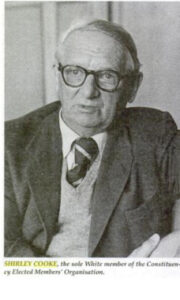A Maverick Politician – Shirley Victor Cooke

In the very early days of colonial Kenya it was rare for officials to assume that the welfare of the native population should be paramount. One such man was SV Cooke. Born at Ennistimon, County Clare, in 1888, he was the son of an Irish parson. He began his career in Kenya as a District Officer in 1919. As was the practice, he was posted from place to place, never staying very long in each, before he ended up in Lamu. While there in 1929 he fell out with his superior HR Montgomery, brother of the Field Marshal and Provincial Commissioner at Mombasa, whom he called a ‘bloody fool’. Montgomery would not tolerate the insult and Cooke was moved.
This was not the first of his misdemeanours. While at Marsabit in 1927 he was censured for being insubordinate. The settlers once instituted an enquiry about him, because he supported African interests against theirs. This irrepressible Irishman was transferred to Tanganyika, where there were fewer settlers, but again he quarrelled with his superiors. By 1930 he had left the Colonial Service and entered politics. He had now found his true vocation. He remained a member for the Coast of Kenya’s Legislative Council for more than twenty years, putting forward the African point of view and generally taking an individualistic line. Indeed he was the enfant terrible of LegCo for his outspoken comments.
He particularly deplored the lack of medical services for Africans, and their substandard housing. He urged the government in 1940 to organise sociological surveys of the large towns. He heavily criticised the living conditions for Africans in towns, writing to the Governor: ‘It seems to be no one’s business, apart from the amateur efforts of missionaries, to study these.’ He urged the government to remedy the situation.
In 1957 a new constitution allowed Africans to have an additional six elected seats in LegCo. Soon after the elections there was a demand for twelve extra seats for Africans and this prompted the setting up of a constitutional commission to work out a new constitution. It was suggested that a constitutional expert should examine the Kenyan constitution and devise a plan which could be accepted by all communities. All the European members of LegCo disagreed with this except one – SV Cooke, who was supportive. However, a delegation, of which Cooke was the sole European member, was sent to London to press for a constitutional conference. It was not very successful but it did persuade the Colonial Secretary to hold another conference. This became known as the Lancaster House conference which led ultimately to Kenyan independence.
Once his ambitions had been achieved, Cooke retired from LegCo to his farm on the Kinangop. He loved watching Rugby with his friend Alfred Dalton. Ultimately he went to England, where he died at Sedgehill, Wiltshire, on 7 January 1973.

Recent Comments